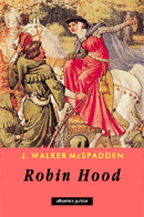|
“Now it fell out that one day not long
thereafter, Robin was minded to try his skill at hunting. And not
knowing whom he might meet in his rambles, he stained his face and put
on a sorry looking jacket and a long cloak before he sallied forth. As
he walked, the peacefulness of the morning came upon him, and brought
back to his memory the early days so long ago when he had roamed these
same glades with Marian. How sweet they seemed to him now, and how far
away! Marian, too, the dainty friend of his youth – would he ever see
her again? He had thought of her very often of late, and each time with
increasing desire to hear her clear voice and musical laugh, and see her
eyes light up at his coming…”
Excerpt
Chapter 1
How Robin Hood Became an Outlaw
List and hearken, gentlemen,
That be of free-born blood,
I shall you tell of a good yeoman,
His name was Robin Hood.
Robin was a proud outlaw,
While as he walked on the ground.
So courteous an outlaw as he was one
Was never none else found.
In the days of good King Harry the Second of England—he of the warring
sons—there were certain forests in the north country set aside for the
King’s hunting, and no man might shoot deer therein under penalty of
death. These forests were guarded by the King’s Foresters, the chief of
whom, in each wood, was no mean man but equal in authority to the
Sheriff in his walled town, or even to my lord Bishop in his abbey.
One of the greatest of royal preserves was Sherwood and Barnesdale
forests near the two towns of Nottingham and Barnesdale. Here for some
years dwelt one Hugh Fitzooth as Head Forester, with his good wife and
son Robert. The boy had been born in Lockesley town—in the year 1160,
stern records say—and was often called Lockesley, or Rob of Lockesley.
He was a comely, well-knit stripling, and as soon as he was strong
enough to walk his chief delight was to go with his father into the
forest. As soon as his right arm received thew and sinew he learned to
draw the long bow and speed a true arrow. While on winter evenings his
greatest joy was to hear his father tell of bold Will o’ the Green, the
outlaw, who for many summers defied the King’s Foresters and feasted
with his men upon King’s deer. And on other stormy days the boy learned
to whittle out a straight shaft for the long bow, and tip it with gray
goose feathers.
The fond mother sighed when she saw the boy's face light up at these
woodland tales. She was of gentle birth, and had hoped to see her son
famous at court or abbey. She taught him to read and to write, to doff
his cap without awkwardness and to answer directly and truthfully both
lord and peasant. But the boy, although he took kindly to these lessons
of breeding, was yet happiest when he had his beloved bow in hand and
strolled at will, listening to the murmur of the trees.
|

